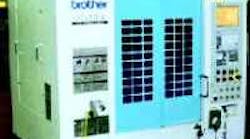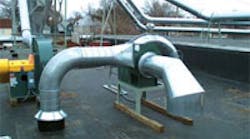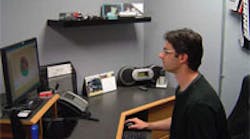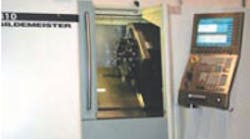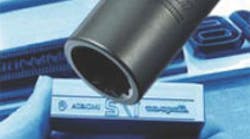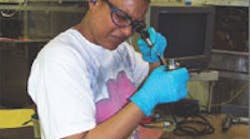To increase production flexibility, Top Die Casting runs its Brother VMCs as either standalone units or in cells.
Drum-style toolchangers on its Brother VMCs provide Top Die Casting with a 1.8-sec chip-to-chip toolchange time.
Top Die Casting in South Beloit, Ill., makes itself more competitive by producing better parts for less money. It does so on accurate machines with fast cycle times and flexibility for use as part of a cell or as standalone units. The machines are Brother vertical machining centers.
The manufacturer of aluminum castings purchased its first Brother machine eight years ago to set
alongside an existing line of Mori Seiki CNC lathes as a cell. Currently, the shop runs Brother machines as standalone units as well as in cells. "In the past five years, we've bought more Brother machining centers than anything else. It's the new thinking of today — away from larger dedicated machines to doing faster, more efficient work," comments Cordell Landenberger, CNC supervisor with Top Die.
The company's most recent purchase of Brother's TC-S2A and TC-S2A-0 Performance Series machines increases the shop's spindle speeds to 10,000 rpm and rapid-traverse capabilities to 1,968 ipm. Drum-style toolchangers further contribute to machine efficiency by providing a 1.8-sec chip-to-chip toolchange time.
Another factor that influenced Top Die's decision to choose Brother was the machine controller. It features an original conversational system that reduces the time from programming to machining. "We preferred Brother because the indexer control is integrated directly into the machine control," adds Landenberger.
The Brother machines also provide accurate machining through their rigid construction. "The machines are beefier — with good-sized ballscrews and guide-ways," says Landenberger. "With the machines, we've held tolerances of 0.0005 in. on bores."
Yamazen Inc.
Schaumburg, Ill.
www.yamazen.com
[email protected]
